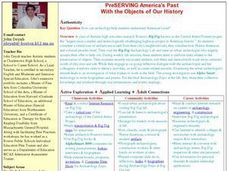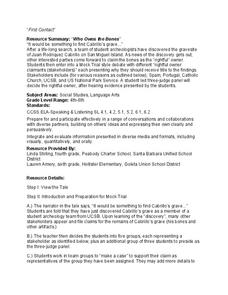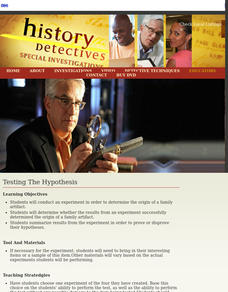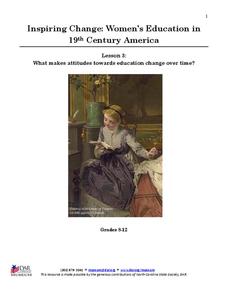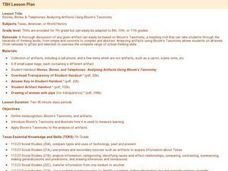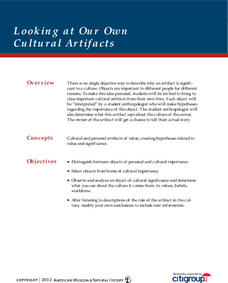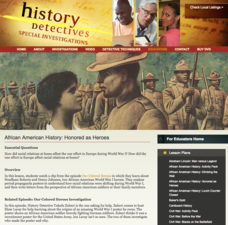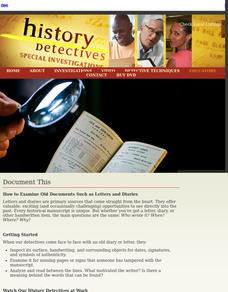University of Chicago
Using Artifacts for Clues About Identity
Learn about the ancient Near East through a close examination of ancient artifacts. Lead your class into analysis by first observing an artifact as a class. Pupils can then work in pairs to analyze the other artifacts and compile a list...
Channel Islands Film
Telling Your Own Story
After watching and discussing a video on the Voyage of Cabrillo, individuals craft their own origin story and design and build an artifact they feel best represents their history.
Channel Islands Film
Cache: Lesson Plan 2 - Grades 4-6
Class members will dig this activity that has them trying their hand at recovering artifacts. Groups are assigned a section of a sandbox, carefully uncover the artifacts in their section, and then develop theories about who might have...
Channel Islands Film
Cache: Lesson Plan 1 - Grades 9-12
Archaeologists have discovered a cache of Native American relics. They want to preserve these relics by removing them from the rapidly eroding site to a lab where they can be studied. Native American traditions demand that the items be...
PBS
Family History: Treasure Troves
It's time for show and tell! Scholars investigate historical artifacts to determine what secrets they reveal about the time periods they represent. They then research their own personal artifacts, as well as those from World War I.
PBS
Predicting/Making a Hypothesis
As an introduction to the hypothesis and testing method of investigation, young history detectives engage in a special investigation of a family artifact. After watching a short video that demonstrates the method, they develop a...
Curated OER
Social Studies: Exploring Boston's Big Dig
Students, in a high school class for autistic children, take a virtual tour of Boston's "Big Dig" and the artifacts discovered there. During weekly lab sessions, they discover the processes involved in artifact preservation. Using...
ReadWriteThink
Designing Museum Exhibits for The Grapes of Wrath: A Multigenre Project
Challenge readers of John Steinbeck's The Grapes of Wrath to create a museum exhibit that uses artifacts to focus on one issue raised by the award winning story of the Great Depression, the Dust Bowl, and the Joads.
Channel Islands Film
Cache: Lesson Plan 3 - Grades 4-5
Should the excavation of what is believed to be the cave of the Lone Woman of San Nicholas Island be allowed to continue? As a practice exercise designed to prepare pupils for a timed writing exam, individuals read two Los Angeles Times...
PBS
1000 Words
A picture really can speak a thousand words—no matter how old! Scholars become history detectives as they learn how to analyze historical photos and evidence to uncover the past. The fun hands-on activity makes history come alive through...
Channel Islands Film
Cache: Lesson Plan 4 - Grades 4-5
After viewing the West of the West's documentary Cache, individuals craft either a newspaper article chronicling the discovery of the cache on San Nicolas Island, a historical narrative of the placement of the cache in the cliff side, or...
Channel Islands Film
Who Owns the Bones
A study of the history of the Channel Islands, located off the coast of southern California, continues as class members conduct a mock trial to determine which group of stakeholders should have the right to claim the remains of Juan...
Channel Islands Film
Sa Hi Pa Ca (Once Upon a Time): Lesson Plan 2
What tools do archaeologists and anthropologist use to learned about what life was like in the past. After watching West of The West's documentary Once Upon a Time that details how scientists use artifacts to establish a history of the...
PBS
Testing The Hypothesis
After choosing one experiment from the four they conducted in the previous lesson, young investigators analyze the evidence they collected to determine if it proves or disproves their original hypothesis.
Channel Islands Film
Arlington Springs Man: Lesson Plan 3
Imagine being part of a team of scientists that discover the oldest human remains in North America. Imagine being part of the crew that documents this discovery. Class members get a change to be part of such an exciting adventure in a...
National Society Daughters of the American Revolution
Lesson 3: What Makes Attitudes Towards Education Change over Time?
The struggle for women's rights is not unique to this generation, or even to the 20th century. Class members explore the conflicting opinions of Alexander Graham Bell and his wife, Mabel Hubbard Bell, regarding women's pursuits of higher...
National Park Service
Maltese Cross Cabin
The Maltese Cross Cabin, a frontier residence of Theodore Roosevelt, is a time capsule that commemorates Roosevelt's time in the Dakota territory. An explanatory video and response guide takes students on a virtual tour of the wooden...
Curated OER
Social Studies: Aztec Calendars and Culture
Sixth graders analyze the Aztec calendar and create their own examples of them. They determine the meaning of the symbols used in the calendars and record their ideas in journals. Students host a parent breakfast for them to observe...
Constitutional Rights Foundation
Harriet Tubman and the End of Slavery
Harriet Tubman saved hundreds from slavery through what was called the Underground Railroad. Teach learners about her amazing accomplishments through the article that uses effective direct instruction. After reading, scholars break into...
Curated OER
Stones, Bones & Telephones: Analyzing Artifacts Using Bloom's Taxonomy
Seventh graders define metacognition, Bloom's Taxonomy, and artifacts. They, in groups, try to identify a mystery artifact using the Artifact Analysis sheet. They present their findings to the class.
Curated OER
Artifacts
Pupils examine different artifacts and determine the difference between personal and cultural objects. They collect items from their home of cultural importance as well. They identify all they can from artifacts they are given to analyze.
Smarter Balanced
Archaeological Discoveries
Artifacts, inscriptions, and monuments. Here's an activity designed to ensure that all learners are familiar with the key terms and concepts they will need to begin a study of archaeological discoveries.
PBS
African American History: Honored as Heroes
To gain an understanding of the treatment of African American soldiers during World War I, class members watch an excerpt from the History Detectives film, Our Colored Heroes, and then examine three recruitment posters from that time...
PBS
Document This
Being a historian requires serious sleuthing. They examine primary source documents and look for evidence, for clues that reveal who wrote the document, when, and why. After watching two historians model the process, young history...








